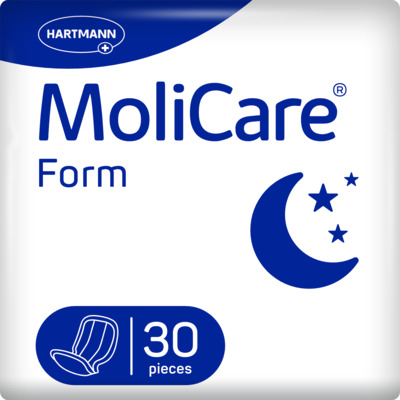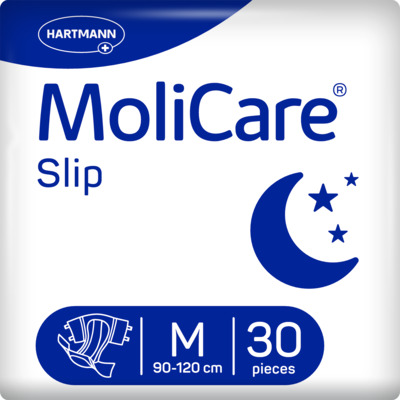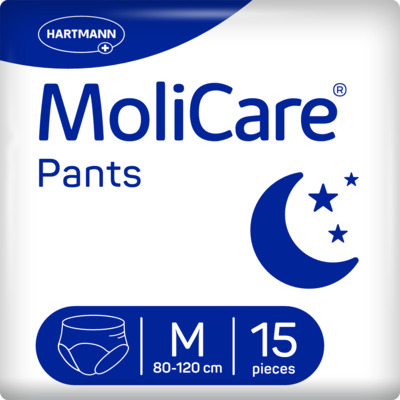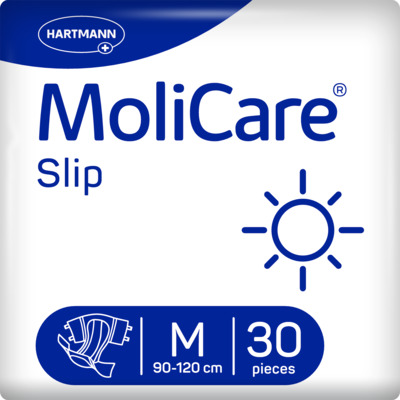Incontinence Advice
Parkinson’s and Incontinence: Managing Bladder and Bowel Problems
There has been a notable correlation between Parkinson's disease and incontinence. Parkinson's mainly affects motor functions in the body and can therefore cause incontinence. In this article, you will learn about the parallels between Parkinson’s and incontinence, as we highlight the association with urinary and bowel incontinence alongside the condition. We will explore the underlying causes, symptoms, ways of managing the condition, and treatment options.

What Is Parkinson's Disease
Parkinson's disease is a complex condition that extends beyond its well-known impact on movement, such as tremors and stiffness. It also encompasses a range of non-motor symptoms, significantly affecting the autonomic nervous system. This system is responsible for regulating involuntary bodily functions like heart rate, blood pressure, and the operations of the gastrointestinal and urinary systems.
Parkinsons and Incontinence Managing Bladder and Bowel Problems
Symptoms of Parkinsons Disease
Parkinson's disease can cause a wide variety of symptoms, and the ones that affect mobility are often the most recognisable. These common symptoms are known as motor symptoms and include:
Involuntary shaking of certain parts of the body (tremors)
Stiff and inflexible muscles (rigidity)
Slowness of movement, sometimes described as a ‘shuffle'
Parkinson’s disease can also cause a variety of what are known as non-motor symptoms; these are symptoms that are not associated with mobility. They can also significantly affect quality of life. Common non-motor symptoms include:
Bladder and bowel incontinence
Eating and swallowing difficulties
Visual disturbances, such as blurred or double vision
Fatigue and energy depletion
Muscle cramps and discomfort
Challenges with speech and communication
Parkinson's Disease and Incontinence
Parkinson's disease can impair the brain's ability to control muscle movements, which can therefore lead to difficulty controlling the muscles surrounding the bladder and bowels. Not everyone with Parkinson’s will develop incontinence, but bladder and bowel disorders are more common in people of the same age with Parkinson’s than those without.
Urinary Incontinence
Parkinson’s disease can cause difficulties with both urine storage and release.
Key urinary symptoms include:
Urge Incontinence: The need to urinate frequently
Nocturnal enuresis: A frequent need to urinate at night
Nighttime can be particularly challenging, due to frequent waking up to urinate. Those with Parkinson's may face frequent urges to urinate along with the involuntary release of urine. This is compounded by mobility challenges that make it difficult to get to a toilet. In some cases, dystonia (involuntary muscle contractions) can affect people with Parkinson’s, further complicating the situation.
If you or someone you care for is experiencing unexpected bed wetting in the night, MoliCare recommends trying a disposable bed sheet or water resistant mattress protector for an added layer of protection.
Learn more about Urinary Incontinence in our detailed guide.
Bowel Incontinence
As Parkinson’s disease can impair the brain's ability to control muscle movements, this can also lead to difficulty controlling the muscles surrounding the bowel. Bowel incontinence is usually only seen in advanced Parkinson's disease. It can be a distressing symptom and profoundly affect the dignity and quality of life for those with the condition. Bowel incontinence may arise due to various factors, but can be managed using various techniques and bowel incontinence pads. In some cases, it can be due to complications unrelated to Parkinson’s disease. However, within the context of Parkinson’s disease, the following scenarios are common:
Constipation: Constipation is a common issue and can lead to severe abdominal pain. It requires active management to prevent complications like bowel obstruction, a potentially life-threatening condition necessitating urgent medical intervention.
Constipation-induced incontinence: Severe constipation can also lead to faecal impaction, where hard stool blocks the bowel. This blockage can force softer stool to leak around the impacted faece.
Gastroparesis: This is a long-term condition where food passes through the stomach slower than it should. Symptoms include nausea, fullness, and pain. Gastroparesis can delay the movement of medication from the stomach to the small intestine, affecting drug efficacy and potentially causing 'off' periods where symptoms return or worsen. Managing gastroparesis [1] involves dietary adjustments, such as eating smaller, more frequent meals and avoiding high-fat foods.
Neurogenic incontinence: Parkinson’s disease can impair the nerve function controlling the anal sphincter, leading to involuntary stool release.
In advanced Parkinson’s disease, these gastrointestinal issues are intertwined with the motor symptoms of the condition, making it harder to get to a toilet. Effective management requires a holistic approach, addressing both the symptoms and the underlying causes. Carers and healthcare professionals must be vigilant in monitoring these symptoms and implementing appropriate interventions to enhance the wellbeing and comfort of those affected.

Consult a healthcare professional
Due to the complex nature of Parkinson’s disease, managing the condition requires a professional approach that may include medical, surgical, and/or lifestyle interventions. Tailored treatments and regular consultations with healthcare professionals can significantly improve quality of life, allowing individuals to manage symptoms effectively to maintain their dignity and wellbeing.
Seeing a physiotherapist is often recommended as they can provide tailored exercises to help maintain mobility and functionality. They can also offer advice about pelvic floor exercises.
Medication and specialist consultation
There are various medications that can help manage the main symptoms of Parkinson’s disease, such as shaking (tremors), and movement problems. Medication can also be recommended for other common symptoms associated with the condition such as urinary problems and constipation, for example, laxatives can be used to regulate bowel movements.
As medication can improve the speed and coordination of movement or lessen a tremor, it can lead to increased mobility making it easier to physically get to the toilet. This can lead to a reduction in episodes of incontinence as people are more likely to reach the toilet in time.
Dietary considerations and routine
Maintaining a balanced diet rich in fibre and fluids is vital for bowel health, helping to prevent constipation and regulate bowel movements. Limiting irritants like caffeine, carbonated drinks, and alcohol can also alleviate bladder irritation. Establishing a routine for toileting, especially after meals, and regulating fluid intake can significantly reduce episodes of incontinence.
To manage bowel incontinence, dietary adjustments are crucial. High-fat and low-fibre diets should be avoided, as they can worsen stool consistency. A daily fibre supplement and maintaining a food diary can help manage bowel movements. Pelvic floor exercises and the use of appropriate incontinence products are also beneficial for managing symptoms.
Read our guidance, which focuses on foods that irritate the bladder and bowels, as well as bladder cleansing foods, for further details about what to eat and drink (and what not to eat and drink) to alleviate incontinence symptoms.
Adaptations And Continence Products
As people with Parkinson’s disease can struggle with mobility, adaptations to get to the toilet easily can greatly reduce episodes of incontinence and improve quality of life. Adaptations such as easy-to-remove clothing and modifications to the home environment like handrails and accessible toilet equipment can greatly assist those with Parkinson's in managing incontinence and enhancing independence and safety.
Continence products and protective bedding can also help to manage incontinence, as they can assist in maintaining hygiene, and improving comfort. For nighttime, use these mobile pants 8 drops.
Indwelling Catheterisation
A catheter may be recommended by a healthcare professional if other treatments, such as pelvic floor exercises and medication, have not improved continence or are not appropriate. This involves the insertion of a catheter through the urethra into the bladder, allowing urine to drain into a bag or through a valve. Catheters can be used for short or long periods of time. Regular replacement of the catheter, typically every few weeks, is essential to prevent infections and maintain hygiene.
Surgical Solutions
Suprapubic catheterisation is a long-term solution for managing urinary incontinence. This surgical procedure involves placing a catheter directly into the bladder through the abdomen, providing an alternative urine drainage route. Like the indwelling catheter, it connects to a drainage system and requires regular monitoring and care.
To keep yourself comfortable when managing the condition, find the ideal products from HARTMANN Direct UK. Remember to subscribe to our mailing list to receive exclusive offers and articles direct to your email.

FAQs
In what stage of Parkinson's disease does incontinence start?
Incontinence typically starts in the later stages of Parkinson's disease. Motor symptoms often worsen as the disease progresses, affecting the control of bladder functions.
What are the signs that Parkinson's disease is getting worse?
These include increased severity and frequency of tremors, rigidity, and bradykinesia (slowness of movement), greater difficulty with balance, changes in speech and writing, more pronounced cognitive decline, and increased difficulties with activities of daily living.
How do you manage incontinence with Parkinson's disease?
This can involve pelvic floor exercises, bladder training, scheduled toileting, medication to control bladder function, and using absorbent products or devices. Consulting a healthcare provider for individualised management is also important.
Does Parkinson's disease affect your bladder?
Yes, Parkinson's can affect the bladder, leading to issues such as overactive bladder, urgency, frequency, nocturia (frequent nighttime urination), and difficulty emptying the bladder fully, contributing to incontinence.
What causes Parkinson’s disease?
It's important to consider the recent update about pesticides which are now linked to Parkinson’s disease risk[1]. Learn more now.
Sources
NHS. (n.d.) Parkinson’s Disease. [online] Available at: https://www.nhs.uk/conditions/parkinsons-disease/ [accessed 12/03/24]
Flynn, H., (2024) Another 3 common pesticides are now linked to Parkinson’s disease risk. Medical News Today. [online] Available at: https://www.medicalnewstoday.com/articles/another-3-common-pesticides-are-now-linked-to-parkinsons-disease-risk [accessed 12/03/24]
NHS. (n.d.) Gastroparesis. [online] Available at: https://www.nhs.uk/conditions/gastroparesis/ [accessed 12/03/24]
MoliCare Form for Night
<h2>Large Incontinence Pads for protection at night </h2> <p>Having no control over your bladder and only being able to reach the toilet with help or not at all is particularly stressful at night. The simple and affordable MoliCare® Form Night solution provides relief while you sleep. The large incontinence pads provide reliable protection that helps those affected and carers to enjoy undisturbed sleep. </p> <p>Wear with net pants for heavy duty incontinence pads with MoliCare® Form Night Large Incontinence Pads replace your regular underwear. The absorbent core inside the large incontinence pads quickly locks away urine and ensures a pleasantly dry feeling on the skin, even during the longer wear time at night. </p> <p>MoliCare® Form Night helps to keep intimate skin healthy by preserving its natural pH value and protection. At the same time, the absorbent core neutralises unpleasant odours. </p> <p>MoliCare® Form Night are overnight large pads for incontinence designed for reliable protection during the night. You can recognise them by the moon on the packaging. They complement MoliCare® Form Day large incontinence pads which provide reliable protection during the day. </p> <h2>Who is MoliCare® Form Night suitable for? </h2> <p>MoliCare® Form Night large incontinence pads are suitable for women and men with moderate to heavy incontinence who are looking for a reliable solution for the night. They lose more than 200 ml of urine at night and are unable to control their bladder. The bladder empties unexpectedly large amounts of urine. </p> <p>Heavy-duty incontinence pads are suitable for users who are severely restricted in their mobility. Toileting is only possible with assistance - if the user is not bedridden. MoliCare® Form Night large incontinence pads are therefore also suitable for caring for relatives. </p> <h2>Affordable large pads for incontinence: effective protection through the night </h2> <p>Highly absorbent and with odour control, the large incontinence pads are also made from soft material for your comfort. </p> <p>MoliCare® Form Night are very skin-friendly. The slightly acidic pH value in the intimate area protects the skin from external contaminants such as urine. MoliCare® Form Night preserves this natural pH value and protects the skin. In combination with MoliCare® Skin solutions that clean, protect and care for skin, MoliCare® Form Night help to prevent irritation and skin damage in the intimate area. </p> <p>You usually need no more than two MoliCare® Form Day large incontinence pads during the day and one MoliCare® Form Night large pad for incontinence for the night. This gives you a low cost yet high-quality round-the-clock supply of large incontinence pads from HARTMANN. </p> <h2>We are HARTMANN </h2> <p>MoliCare® is HARTMANN’s extensive range of continence care products. For over 40 years, we have been developing effective, reliable products that help people manage the challenges of living with incontinence. Our aim is to provide the right solution for every need. </p>
MoliCare Slip for Night
<h2>Low cost adult nappy</h2> <p>MoliCare Slips for Day and Night are an all-in-one brief or adult nappy for both men and women providing reliable protection for moderate to severe levels of urinary incontinence. These slips are also ideal for use for people with feacal incontinence or double incontinence to provide a containment before cleansing.</p> <p>Skin feels dry and comfortable for improved well being thanks to the absorbent core with locks in liquids and neutralises odours. Safe and secure fit close to the body, skin friendly and dermatologically tested.</p> <h2>Choosing your size</h2> <p>Measure the waist at the largest width between the waist and hips and select the product size.</p> <p>Medium: 90 – 120cm</p> <p>Large: 120-150cm</p>
MoliCare Pants for Night
<h2>Incontinence pants for protection at night </h2> <p>Don’t let incontinence disturb your sleep. MoliCare® Pants Night is the simple and affordable solution for reliable protection at night. </p> <p>MoliCare® Pants Night incontinence pants for adults, also known as pull up panties, are worn like regular underwear and are available in sizes M and L. The absorbent core inside the incontinence pants quickly traps urine and ensures a pleasantly dry feeling on the skin even during the longer wear time at night. </p> <p>MoliCare® Pants Night help to keep intimate skin healthy by maintaining its natural pH value. At the same time, the absorbent core neutralises unpleasant odours. Soft and close-fitting double cuffs at the leg openings also prevent leakage. </p> <p>MoliCare® Pants Night are designed for reliable protection at night. You can recognise the nighttime incontinence pants by the moon on the packaging. They complement MoliCare® Pants Day incontinence pants which provide discreet protection during the day. </p> <h2>Who are MoliCare® Pants Night suitable for? </h2> <p>MoliCare® Pants Night are suitable for women and men with moderate incontinence who are looking for a reliable solution for the night. They lose up to 200 ml of urine at night and cannot always reach the toilet in time. <br /> <br /> They can go to the toilet independently or with a little help. MoliCare® Pants Night are suitable for urge incontinence. </p> <p>Highest wearing comfort and still affordable: MoliCare® Pants Night </p> <p>Thanks to fast absorption and odour-control, the incontinence pants provide reliable, comfortable protection while you sleep. MoliCare® Pants Night are extremely comfortable to wear. The soft, noiseless material means you will hardly notice the difference to regular underwear. </p> <p>MoliCare® nighttime incontinence pants are very skin-friendly. The slightly acidic pH value in the intimate area protects the skin from external contaminants such as urine. MoliCare® Pants Night help to maintain this natural pH value and protect the skin. </p> <p>You usually need no more than two MoliCare® Pants Day inco pants during the day and one pair of MoliCare® Pants Night incontinence pants for the night. This gives you a low cost yet high-quality round-the-clock supply of incontinence pants from HARTMANN Direct. </p> <h2>We are HARTMANN </h2> <p>MoliCare® is HARTMANN’s extensive range of continence care products. For over 40 years, we have been developing effective, reliable products that help people manage the challenges of living with incontinence. Our aim is to provide the right solution for every need. </p> <h2>Choosing your Size</h2> <p>Measure the waist at the largest width between the waist and hips and select the product size.</p> <p>Medium: 31-47 inches (80 – 120cm)</p> <p>Large: 39-59 inches (100-150cm)</p> <p> </p> <h2>Delivery service</h2> <p>Fast, reliable delivery service for all your essential <a href="https://www.hartmanndirect.co.uk/">HARTMANN Direct</a> incontinence products straight to your door. Take advantage of our convenient online ordering system and benefit from our price match promise, along with free delivery on orders over £50. </p> <p><strong>Need more help?</strong> Our friendly customer service team are waiting to help you choose the right product – call 0800 028 9470.</p>
